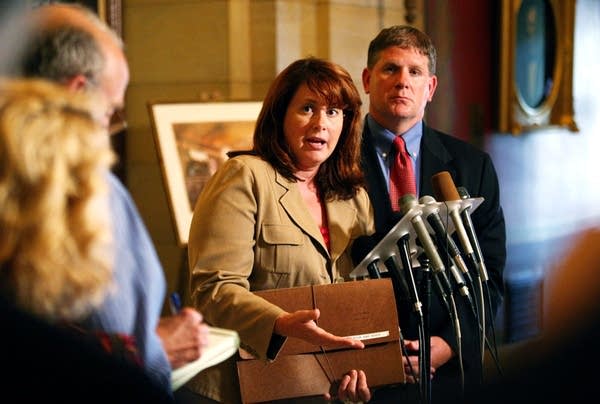No budget talks; commission weighs in with recommendations

It's the seventh day of a state government shutdown, and a Ramsey County judge began ruling on some of the funding requests of groups that have pleaded their case before a special master.
There were no negotiations Thursday between Gov. Mark Dayton and Republican legislative leaders aimed at ending the state government shutdown, but an independent commission weighed in with its proposed framework for a budget deal.
The ruling from Ramsey County Chief Judge Kathleen Gearin allows state and federal special education funding to continue flowing to Intermediate School Districts during the shutdown. Funding will also continue for emergency welfare programs and training programs for the blind.
In addition, Gearin's order directs the Department of Human Services Licensing Division to restart background checks for those who work with vulnerable populations.
Create a More Connected Minnesota
MPR News is your trusted resource for the news you need. With your support, MPR News brings accessible, courageous journalism and authentic conversation to everyone - free of paywalls and barriers. Your gift makes a difference.
Lawrence Massa, president and CEO of the Minnesota Hospital Association, said the ruling allows hospitals to fill crucial positions.
"The background check issue -- because of the way Minnesota law works -- really was creating a bit of a hiring freeze for staff that had caregiver, direct-patient responsibilities," said Massa.
But Gearin denied a funding request for an ARC Minnesota program that helps developmentally disabled people find housing. The rulings ratified recommendations from former state Supreme Court Chief Justice Kathleen Blatz, who is serving as a court-appointed referee on shutdown programs and services.

There's still no political resolution to the shutdown in sight. But a panel of former legislators and state finance officials unveiled its recommendations.
The so-called "third way" budget commission, which was convened by former Vice President Walter Mondale and former Gov. Arne Carlson, proposed $3.6 billion in unspecified spending cuts and $1.4 billion in revenue increases.
Those increases include human services surcharges, increases in cigarette and alcohol taxes and a temporary 4 percent income tax increase on all Minnesotans.
Gov. Dayton, a DFLer, said the recommendations are largely in line with what he's proposed, but he thinks only people with high incomes should pay higher income taxes. Republicans rejected the panel's report.
Dayton and Republican legislative leaders did not hold a negotiation session today, but they did have a brief meeting to discuss funding for public schools. Rep. Pat Garofalo, R-Farmington, chair of the House education committee, said he thinks a deal on the K-12 bill is within reach.
"Shifting [K-12 education] dollars is a very difficult proposal, but all of the proposals now are really difficult,
"We've had an agreement on what we're spending on education for over a month now," Garafalo said. "So I think this could be wrapped up very, very quickly. The potential exists. I'm not saying we're there, but again, we agreed on what we're going to be spending."
But there are still deep disagreements over policy provisions in the bill, and Republicans now say their K-12 spending proposal is tied to those K-12 policy measures, which include private school vouchers and a significant restructuring of integration aid.
Rep. Mindy Greiling, DFL-Roseville, who was at the meeting, said the two sides are still miles apart.
"The unfunded mandates with their policy in this bill dwarf the little bit of money that they might want to agree to," said Greiling. "We can't go along with all of this unfunded mandate policy. And besides that, most of it is very bad policy that doesn't benefit students."
Gov. Dayton did not comment on the meeting. His education commissioner Brenda Cassellius said the discussion was productive, but they did not reach any specific compromises.
Both sides appear to agree that a final budget agreement will include an additional shift in school aid payments to help close the $5 billion budget deficit. Cassellius said she thinks school districts can handle another shift, but it's not an ideal choice.
"Shifting dollars is a very difficult proposal, but all of the proposals now are really difficult, and trying to find a solution is something that has to happen," said Cassellius. "But the shift is one very, very difficult proposal, given it doesn't solve anything structurally. It just kicks it down the road."
Progress toward an overall budget deal stalled Wednesday when Republican leaders rejected Dayton's latest proposal. He offered the GOP a choice between a temporary income tax increase on Minnesotans earning more than $1 million a year, or a $1 per pack tax increase on cigarette purchases.
Still, Senate Majority Leader Amy Koch renewed her request that Dayton call a special session to allow legislators to work on some of the budget bills.
"On many of these bills, these could be wrapped up," said Koch. "Why would we not wrap up K-12? If we have a number we agree on, we can come to agreement on these reforms, which I believe we absolutely can, why not wrap up that bill? Why not get that concern, that issue off the table? We should."
No further budget negotiations are scheduled. Neither Koch nor GOP House Speaker Kurt Zellers would say if they were preparing a counter offer for the governor.
